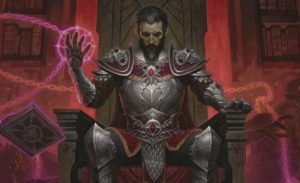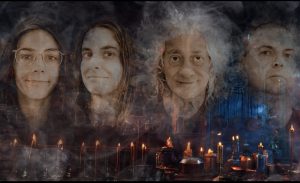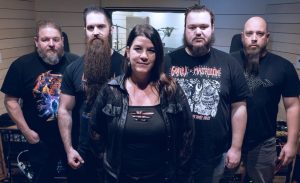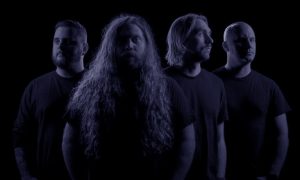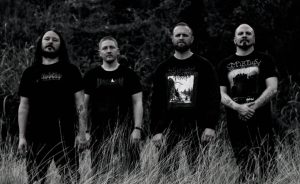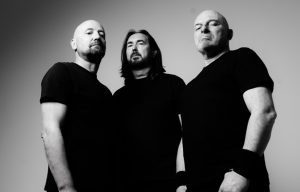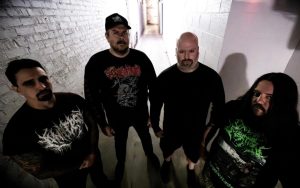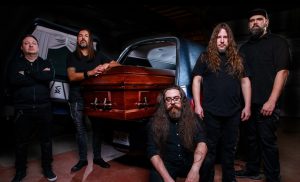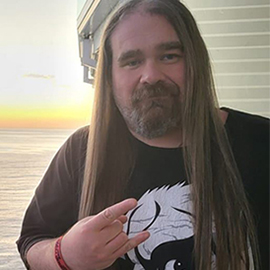
[Propriétaire MU Média – MetalUniverse.net]
Orchestre Tisonnier présente son premier album complet « Si tu meurs, j’te tue »
Avec son folk acoustique aux racines bien ancrées dans la culture québécoise, le groupe de Victoriaville Orchestre Tisonnier trace sa voie singulière sur la scène locale depuis trois ans. Porté par une énergie brute et des textes oscillant entre festivité et mélancolie, le groupe vient de franchir une étape majeure avec la sortie de son premier album complet, Si tu meurs, j’te tue. Pour en savoir plus sur la démarche derrière ce projet, les influences et la vision du groupe, MetalUniverse.net s’est entretenu avec Orchestre Tisonnier.
Par Marc Desgagné (MetalUniverse.net, Québec, Canada)
MU : Tout d’abord, comment décririez-vous Orchestre Tisonnier à quelqu’un qui ne vous connaît pas? Quelles sont vos principales influences?
Orchestre Tisonnier : Je dirais que c’est l’aboutissement de plusieurs années d’influences de groupes rock, punk et métal américains et anglais qui ont marqué notre jeunesse, mais avec de profondes racines québécoises. On est vraiment un band folk et on n’a vraiment pas la prétention de faire du rock ou du punk, encore moins du métal. Je pense, sans prétention, qu’on s’inscrit dans la même lignée que Richard Desjardins ou Félix Leclerc, c’est juste qu’on a passé notre jeunesse à écouter du Everytime I Die, Streetlight Manifesto et Red Hot Chili Peppers, pour en nommer quelques-uns.
MU : Votre premier album complet « Si tu meurs, j’te tue » est disponible depuis le 4 septembre. Que représente cette sortie pour vous?
Orchestre Tisonnier : C’est la plus grande fierté du band à ce jour. Un album de production professionnelle pour la première fois, sans aucun compromis. On a mis nos tripes là-dedans, sans essayer de plaire à personne.
MU : Depuis combien de temps travaillez-vous sur cet album et comment les chansons ont-elles pris forme au fil du temps? Est-ce qu’il s’agit de chansons uniquement composées après la sortie de « Des trous dans nos vies » en 2022?
Orchestre Tisonnier : Il y a des chansons sur cet album qu’on jouait déjà en show, avant même la sortie de Des trous dans nos vies. C’est un mélange de vieilles chansons et de compositions vraiment récentes. La marche, qui clôture l’album, n’a jamais été jouée avant l’entrée au studio, je ne savais pas encore comment on allait chanter le texte hahaha.
MU : Le titre de l’album « Si tu meurs, j’te tue » est marquant et intrigant. Quelle est la signification derrière ce choix pour vous et la conception de la pochette?
Orchestre Tisonnier : Les gens meurent. À tous les jours, à n’importe quel âge. Je n’apprends rien à personne. Mais j’ai l’impression qu’on ne prend pas toujours le temps de saisir l’intensité de la mort. Et, en contrepartie, la fragilité de la vie. À un moment donné, un jeune père de famille, un ami d’un ami, s’est suicidé. On prenait le temps de digérer ça, moi pis ma blonde, pis elle me sort ça : “Toi, fais-moi jamais ça! Si tu meurs, j’te tue!” J’ai trouvé ça ironique, mais tellement puissant. La plus grande déclaration d’amour hahaha. Quand j’ai proposé ça aux gars comme nom d’album, c’était unanime, on garde ça. Ça résume tellement bien tous les thèmes des chansons de l’album : l’urgence de vivre, la passion, l’amour, la violence, le deuil, la mort, etc.
Pour la conception de la pochette, on a travaillé avec Miguel Leblanc de WN Art & Design. Il avait lu tous nos textes, écouté l’album. On voulait vraiment rendre justice à la profondeur des tounes. On voulait un bouquet de fleurs, image récurrente dans les chansons, et ça ferait changement de ce qu’on projette habituellement. C’est lui qui a eu l’idée de les faire pendre à l’envers par un nœud coulant, pour provoquer le contraste qu’on nous connaît, entre la lumière et la violence.
Je me suis demandé souvent si les gens allaient bien interpréter cette image, ne voulant pas provoquer inutilement des gens qui ont vécu le suicide d’un proche par pendaison. Le but c’est vraiment d’en parler pour sensibiliser les gens et les aider à traverser ces deuils. Je pense que c’est important de ne pas se mettre la tête dans le sable devant une cause de décès aussi fréquente, c’est 3 personnes par jour qui se suicident au Québec.
MU : Vous avez choisi un registre folk punk acoustique après vos expériences dans le punk, le métal et le hardcore. Qu’est-ce qui vous a poussés vers ce son?
Orchestre Tisonnier : Ça s’est fait tout naturellement. On voulait se partir un band punk hardcore francophone, mais à chaque fois qu’on se réunissait pour piquer les tounes, on les jammait avec nos guit. acoustiques. C’est ça qu’on avait le goût de faire. Ça adonne assez bien, parce qu’on a l’impression d’être assez seuls dans notre branche, de ne pas être la copie pâle d’autres bands du même genre.
MU : La mandoline occupe une place particulière dans vos compositions. Qu’est-ce que cet instrument apporte selon vous à votre identité musicale? Est-ce que d’autres instruments du genre pourraient s’ajouter éventuellement?
Orchestre Tisonnier : On a acheté une mandoline après que le band se soit formé, même chose pour l’accordéon. C’est clair que ça contribue grandement à notre identité musicale. On peut jouer à peu près n’importe quel style du folk trad, au bluegrass, au ska, jusqu’à des breakdowns plus métal, mais comme on le fait avec nos instruments, nos voix, ça sonne toujours comme l’Orchestre! Ça nous donne une immense liberté de création. On parle parfois de mettre d’autres instruments, mais pour l’instant, je pense que c’est une signature à consolider.
MU : Vos textes oscillent entre festivité et mélancolie. Comment parvenez-vous à maintenir cet équilibre entre légèreté et gravité?
Orchestre Tisonnier : Je n’aurai pas le choix de citer Kurt Cobain pour celle-là : “Il n’existe apparemment que deux options pour les auteurs de chansons : le sombre et tragique visionnaire ou le blanc-bec clownesque et tout fou, style “hey, faisons la fête et oublions tout”, et toute cette merde”. Quand j’ai lu cette citation dans le livre de son journal intime, j’ai été sous le choc, sans pouvoir l’expliquer, c’est exactement ça que je me sens quand j’écris.
MU : On le ressent particulièrement dans une chanson comme « On s’était promis ». Pouvez-vous nous en dire plus sur l’histoire ou l’émotion derrière ce morceau?
Orchestre Tisonnier : C’est une chanson fortement ancrée dans le deuil, particulièrement dans la phase de la colère. J’ai essayé de me mettre dans la tête de quelqu’un qui perd l’être cher, trop tôt, trop jeune, quand ils devaient avoir la vie devant eux. Je me dis qu’à un moment, tu dois en venir à être en tabarnak après l’autre. En tout cas, je voulais exprimer que si ça t’arrive de te sentir de même dans le deuil, c’est bien correct, t’as le droit.
MU : Comment décririez-vous la place de la musique québécoise aujourd’hui, et pensez-vous qu’elle offre assez de visibilité aux projets comme le vôtre?
Orchestre Tisonnier : On se sent ensevelis par d’excellents artistes! Il y a toujours des nouveaux bands, des artistes incroyables qui émergent, sans compter des artistes bien établis qui continuent de sortir des œuvres magnifiques. C’est vraiment beau de voir ça.
Est-ce que tout le monde obtient la visibilité qu’il mérite? Clairement pas.
Nous? Je pense que oui haha!
Sérieusement, on est plus que contents de voir la réceptivité pour notre projet, après seulement 3 ans d’existence. On ne veut rien savoir d’être connu du grand public. On ne s’attend pas à ce que tout le monde comprenne ou aime ce qu’on fait. Ce qu’on voudrait, c’est que chaque personne qui aimerait nous écouter puisse nous découvrir. On a l’impression qu’il y a du monde partout au Québec qui pourrait tripper avec nous, mais n’ont aucune idée de notre existence. Par où on passe pour les rejoindre? Possiblement qu’on va devoir rechercher une exposition grand public pour atteindre “notre” public.
C’est probablement des médias comme MU qui nous permettent de toucher le plus directement du monde qui vont comprendre notre affaire. On te remercie vraiment pour l’exposition que tu nous donnes.
MU : Quelle a été la plus grande difficulté pour vous en tant que groupe émergent dans cette scène musicale actuelle?
Orchestre Tisonnier : Ça revient à la question précédente, “exister” pour le bon public. On met beaucoup d’énergie sur les réseaux sociaux parce qu’on pense que ça passe par là de nos jours, mais ça nous emmerde royalement. On a l’impression de déranger le monde avec nos posts. On n’a aucune envie de se montrer la face et faire les clowns sur internet, mais on le fait quand même, dans la mesure où on respecte nos limites. On aimerait bien s’en passer! haha
MU : Vous avez travaillé avec Dominic Boulanger (Studio Le Nid) pour le mixage et Jean-Philippe Villemure (JP Villemure Mastering) pour la masterisation. Qu’est-ce que leur apport a représenté pour le son final de l’album?
Orchestre Tisonnier : Dom a été vraiment un acteur important pour nous. C’est la première expérience studio professionnelle pour le band, donc on avait hâte de voir avec qui on allait travailler. Le fit a été parfait, il était très bien préparé, à 8h15 le matin, il pesait sur REC! Un homme de peu de mots, petit sourire en coin approbateur au bon moment, d’une efficacité inégalable. On n’aurait pas pu espérer mieux, on a vraiment trippé avec lui. On lui a naturellement donné le contrat de mixage après notre expérience en prise de son, il avait tellement bien compris le projet.
Pour JP, c’est une histoire de confiance de plus longue date. C’est lui qui avait mixé et masterisé notre single “C’est du caribou”, qu’on avait enregistré nous-mêmes. Son apport pour ce morceau nous avait mis “sur la map”. Un gars d’expérience, à l’écoute de nos besoins, qui comprend notre projet. C’est tellement agréable, et de plus en plus rare, de travailler avec quelqu’un qui se place dans une vraie position d’écoute.
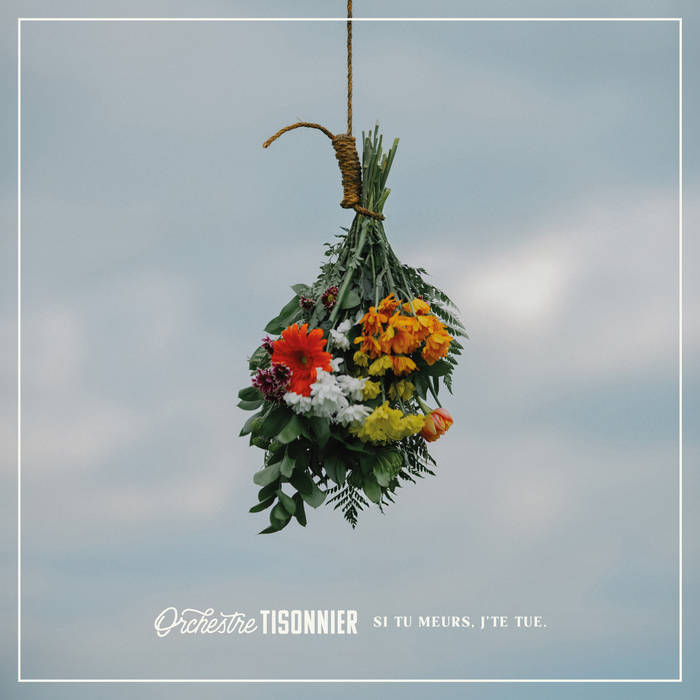
Liste des pièces:
- Vies de chiens – 05:10
- L’échelle d’abandon – 04:14
- Poètes maudits – 03:19
- Ses salopes de larmes – 04:06
- Une bouteille bien vieillie – 03:59
- Pensées cannibales – 02:51
- On s’était promis – 04:06
- La marche – 03:56
MU : Certaines chansons semblent taillées pour être jouées autour d’un feu ou dans des contextes très intimes. Était-ce une volonté dès le départ de créer ce type d’atmosphère?
Orchestre Tisonnier : Absolument pas volontaire, mais c’est un peu dans notre nature. On n’est jamais bien loin de sortir la guit sur le bord d’un feu ou dans le fond d’une cabane à sucre!
MU : En tant que musiciens issus du punk/métal/hardcore, quels éléments de ces genres pensez-vous avoir conservés dans l’Orchestre Tisonnier, malgré le virage folk?
Orchestre Tisonnier : On ne cherche pas à conserver ces éléments, s’il y en a, c’est vraiment par influence indirecte et non calculée. La question qu’on entend le plus souvent quand on compose des nouvelles tounes : “C’tu trop punk ça?” et la réponse est systématiquement “C’est jamais trop punk!” hahaha.
On peut facilement voir un parallèle à la culture métal dans les textes souvent sombres. L’énergie du punk est probablement palpable dans la raucité de la voix et les refrains en “gang”. Je pense aussi que certains picking de guit peuvent donner des indices sur l’autre projet de Francis, lui qui est le bassiste du band hardcore Northwalk.
MU : Quelle est l’importance pour vous de la langue française dans vos paroles? Elles semblent ajouter une authenticité bien particulière au groupe.
Orchestre Tisonnier : C’est important, mais surtout inévitable. Je ne pourrais pas chanter dans une autre langue, ça ne ferait aucun sens pour moi. C’est certain que d’écrire en français comporte un certain défi, je ne sais pas pourquoi, mais on a souvent l’impression que ça sonne vite “quétaine” quand on essaie d’écrire un texte franco. J’espère avoir évité ça le plus possible sur l’album hahaha!
MU : Y a-t-il une chanson de l’album qui représente le mieux l’esprit d’Orchestre Tisonnier et pourquoi?
Orchestre Tisonnier : Probablement “Poètes maudits”. Le texte décrit pas mal notre vision projet!
MU : Si vous aviez à décrire « Si tu meurs, j’te tue » en une seule phrase à quelqu’un qui ne vous connaît pas encore, que diriez-vous?
Orchestre Tisonnier : Une lueur pour les gens en vie, un baume pour les gens en deuil.
MU : Pour conclure, si vous avez un dernier message à adresser à nos lecteurs et à vos futurs auditeurs, quel serait-il?
Orchestre Tisonnier : Un énorme merci à chaque personne qui a pris le temps de lire cette entrevue et qui prendra le temps d’écouter notre album. On serait sincèrement honorés de compter parmi nos rangs, des gens de la communauté de MetalUniverse.net. Merci beaucoup Marc, pour ce que tu fais pour nous, mais pour toute la communauté artistique underground!
Facebook: https://www.facebook.com/OrchestreTisonnier
▶ Écoute/Stream de l’album:
Tous les liens: https://hyperfollow.com/OrchestreTisonnier
Playlist YouTube:
ENGLISH version
Orchestre Tisonnier unveils their first full-length album Si tu meurs, j’te tue
With their acoustic folk-punk sound deeply rooted in Québécois culture, Orchestre Tisonnier has been carving out a singular path on the local scene for the past three years. Driven by raw energy and lyrics that oscillate between festivity and melancholy, the band has now reached a major milestone with the release of their first full-length album, Si tu meurs, j’te tue. To learn more about the vision behind this project, their influences, and their outlook, MetalUniverse.net sat down with Orchestre Tisonnier.
By Marc Desgagné (MetalUniverse.net, Quebec, Canada)
MU: First of all, how would you describe Orchestre Tisonnier to someone who doesn’t know you? What are your main influences?
Orchestre Tisonnier:
I’d say it’s the culmination of several years of influences from American and English rock, punk, and metal bands that marked our youth, but with deep Québécois roots. We’re really a folk band, and we don’t pretend to be rock or punk, let alone metal. I think, without pretension, that we fit in the same line as Richard Desjardins or Félix Leclerc—it’s just that we grew up listening to Everytime I Die, Streetlight Manifesto, and Red Hot Chili Peppers, to name a few.
MU: Your first full-length album Si tu meurs, j’te tue has been available since September 4th. What does this release mean to you?
Orchestre Tisonnier:
It’s the band’s greatest pride to date. A professionally produced album for the first time, without any compromise. We put our guts into it, without trying to please anyone.
MU: How long have you been working on this album, and how did the songs take shape over time? Are they all songs composed after the release of Des trous dans nos vies in 2022?
Orchestre Tisonnier:
There are songs on this album that we were already playing live before Des trous dans nos vies even came out. It’s a mix of older songs and very recent compositions. La marche, which closes the album, had never been played before entering the studio—I didn’t even know yet how we were going to sing the lyrics hahaha.
MU: The album title Si tu meurs, j’te tue is striking and intriguing. What is the meaning behind this choice for you, and how did you approach the artwork?
Orchestre Tisonnier:
People die. Every day, at any age. I’m not teaching anyone anything new. But I feel like we don’t always take the time to grasp the intensity of death, and on the other hand, the fragility of life. At one point, a young father, a friend of a friend, committed suicide. While we were processing that, my girlfriend turned to me and said: “You, never do that to me! If you die, I’ll kill you!” I found it ironic, but so powerful. The greatest declaration of love, hahaha. When I suggested it to the guys as the album title, it was unanimous—we kept it. It sums up so well the themes of the album’s songs: the urgency of living, passion, love, violence, grief, death, etc.
For the cover design, we worked with Miguel Leblanc of WN Art & Design. He had read all our lyrics, listened to the album. We really wanted to do justice to the depth of the songs. We wanted a bouquet of flowers, a recurring image in the lyrics, and it would be a change from what we usually project. He had the idea of hanging them upside down with a noose, to provoke the contrast we’re known for—between light and violence.
I often wondered if people would interpret this image correctly, not wanting to unnecessarily trigger those who had lost someone to hanging. The point is really to talk about it, to raise awareness and help people through their grief. I think it’s important not to bury our heads in the sand in front of such a frequent cause of death—three people a day commit suicide in Quebec.
MU: You chose an acoustic folk-punk direction after your experiences in punk, metal, and hardcore. What pushed you toward this sound?
Orchestre Tisonnier:
It happened completely naturally. We wanted to start a francophone hardcore punk band, but every time we got together to work on songs, we jammed them with our acoustic guitars. That’s what we felt like doing. It works out pretty well, because we feel like we’re fairly alone in our branch—not just a pale copy of other bands of the same style.
MU: The mandolin plays a special role in your compositions. What does this instrument bring to your musical identity? Could other instruments of this type be added eventually?
Orchestre Tisonnier:
We bought a mandolin after the band formed, same for the accordion. It clearly contributes a lot to our musical identity. We can play pretty much any “style”: folk-trad, bluegrass, ska, even heavier metal breakdowns—but since we do it with our instruments and our voices, it always sounds like Orchestre Tisonnier! It gives us huge creative freedom. We sometimes talk about adding other instruments, but for now I think it’s a signature to consolidate.
MU: Your lyrics oscillate between festivity and melancholy. How do you manage to maintain that balance between lightness and gravity?
Orchestre Tisonnier:
I’ll have to quote Kurt Cobain on this one: “Apparently, there are only two options for songwriters: the dark, tragic visionary, or the goofy, clownish white-bread type, like hey, let’s party and forget everything, and all that shit.” When I read that in his published journal, I was shocked, without being able to explain why—it’s exactly how I feel when I write.
MU: That’s something we feel particularly in a song like “On s’était promis.” Can you tell us more about the story or emotion behind it?
Orchestre Tisonnier:
It’s a song deeply rooted in grief, particularly in the anger stage. I tried to put myself in the head of someone who loses a loved one, too soon, too young, when they should have had their whole life ahead of them. I think at some point, you end up being mad as hell at the other person. Anyway, I wanted to express that if you feel that way in grief, it’s okay—you’re allowed.
MU: How would you describe the place of Québécois music today, and do you think it offers enough visibility to projects like yours?
Orchestre Tisonnier:
We feel buried under excellent artists! There are always new bands, incredible artists emerging, not to mention established ones who keep putting out magnificent works. It’s really beautiful to see.
Does everyone get the visibility they deserve? Clearly not.
Us? I think we do, haha!
Seriously, we’re more than happy with how people have received our project, after only three years of existence. We don’t care about being known by the mainstream. We don’t expect everyone to understand or like what we do. What we’d like is for each person who would enjoy our music to be able to discover us. We feel like there are people all over Quebec who could vibe with us, but who have no idea we exist. How do we reach them? Maybe we’ll need more mainstream exposure to reach “our” audience.
It’s probably media like MU that allow us to connect most directly with people who’ll understand what we’re about. We’re really grateful for the exposure you give us.
MU: What has been the biggest challenge for you as an emerging band in today’s music scene?
Orchestre Tisonnier:
It goes back to the previous question—“existing” for the right audience. We put a lot of energy into social media because we think that’s how it works these days, but honestly, we hate it. We feel like we’re annoying people with our posts. We don’t want to show our faces and act like clowns online, but we still do it—within the limits we set for ourselves. We’d love to do without it, haha.
MU: You worked with Dominic Boulanger (Studio Le Nid) for the mixing and Jean-Philippe Villemure (JP Villemure Mastering) for mastering. What did their contributions mean to the final sound of the album?
Orchestre Tisonnier:
Dom was really an important player for us. It was the band’s first professional studio experience, so we were excited to see who we’d be working with. The fit was perfect—he was super prepared, at 8:15 in the morning he was already hitting “REC”! A man of few words, with a little approving smile at the right moment, unbelievably efficient. We couldn’t have hoped for better—we really had a blast with him. We naturally gave him the mixing job after our recording sessions, since he understood the project so well.
As for JP, it’s a longer story of trust. He’s the one who mixed and mastered our single “C’est du caribou,” which we had recorded ourselves. His contribution to that track put us “on the map.” An experienced guy, attentive to our needs, who understands our project. It’s so pleasant—and increasingly rare—to work with someone who really puts themselves in a position of listening.
MU: Some songs seem made to be played around a campfire or in very intimate contexts. Was it your intention from the start to create that type of atmosphere?
Orchestre Tisonnier:
Absolutely not intentional, but it’s kind of in our nature. We’re never far from pulling out a guitar by the fire or in the back of a sugar shack!
MU: As musicians coming from punk/metal/hardcore, what elements of those genres do you think you’ve kept in Orchestre Tisonnier, despite the folk turn?
Orchestre Tisonnier:
We don’t try to keep those elements—if they’re there, it’s really indirect, not calculated. The question we hear most often when we compose new songs: “Is that too punk?” And the answer is always: “It’s never too punk!” hahaha.
You can easily see a parallel with metal culture in the often dark lyrics. The punk energy is probably felt in the rawness of the voice and the gang choruses. I also think some guitar picking gives hints about Francis’s other project—he’s the bassist in the hardcore band Northwalk.
MU: How important is the French language in your lyrics? It seems to add a special authenticity to the band.
Orchestre Tisonnier:
It’s important, but above all inevitable. I couldn’t sing in another language—it wouldn’t make any sense for me. Of course, writing in French comes with a challenge. I don’t know why, but we often feel like French lyrics can easily sound “cheesy.” I hope I’ve avoided that as much as possible on the album, hahaha!
MU: Is there a song on the album that best represents the spirit of Orchestre Tisonnier, and why?
Orchestre Tisonnier:
Probably “Poètes maudits.” The lyrics pretty much describe our vision of the project!
MU: If you had to describe Si tu meurs, j’te tue in one sentence to someone who doesn’t know you yet, what would you say?
Orchestre Tisonnier:
A light for the living, a balm for the grieving.
MU: To conclude, if you have one last message to our readers and your future listeners, what would it be?
Orchestre Tisonnier:
A huge thank you to every single person who took the time to read this interview and who will take the time to listen to our album. We’d be sincerely honored to count people from the MetalUniverse.net community among our ranks. Thank you so much, Marc, for what you do for us, and for the entire underground artistic community!














